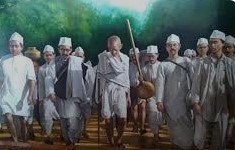INDIGO-CLASS XII ENGLISH FLAMINGO
INTRODUCTION – What is this lesson about?
The story is based on the interview taken by Louis Fischer of Mahatma Gandhi. In order to write on him, he had visited him in 1942 at his ashram- Sevagram where he was told about the Indigo Movement started by Gandhiji. The story revolves around the struggle of Gandhi and other prominent leaders in order to safeguard sharecroppers from the atrocities of landlords.
Louis Fischer reviews ‘The Life of Mahatma’ observing closely ‘The
Champaran episode’. Indigo is about how Mahatma Gandhi struggled for the
underprivileged peasants of Champaran. A simple peasant’s entreaty brings
the historical change to learn courage and self-reliance to protest against the
wrong doers for their rights.
Germany develops Synthetic Indigo and British landlords demand
compensation from peasants for freeing them from 15% compensation. They
torture the peasants for not obeying them

Theme of the Lesson
The chapter displays the importance of effective leadership in improving the lives of people. The author tells us a few reasons which made Mahatma Gandhiji famous and loved by the masses. He was concerned about the plight of the poor and fought for their rights. He also made efforts to uplift them and taught them self-reliance.
The lesson gives us a message that leadership along with empathy are vital for someone to become a people’s person.
BELOW IS THE first VIDEO LESSON OF LESSON- INDIGO ,Class XII ENGLISH FLAMINGO presentated and prepared by TEAM -DIRECTORATE OF EDUCATION skip the video to 8:00 minutes .The second video is down below.
CLICK THE VIDEO BELOW
About Author
Louis Fischer was born in Philadelphia on February 29, 1896, the son of a fish vendor. His parents, David and Shifrah Fischer, were Orthodox Jews who left their Ukrainian hamlet of Shpola, which is close to Kiev, to avoid the pogroms that were taking place there under Alexander III. Fischer’s mother supplemented their income as a laundress, while his father worked as a factory labourer and a fish and fruit seller, according to James William Crowl, his biographer: “Settling in one of Philadelphia’s poorest ghettos… His father’s alcoholism and subsequent abandonment of the family made things worse. Fischer noted that the family was so destitute that they had to relocate often when there wasn’t enough money for the rent in his autobiography, Men and Politics (1941).1

He read the writings of left-leaning authors Henry George and Lincoln Steffens when he was a young guy. He graduated from the Philadelphia School of Pedagogy in 1914 and went on to become a teacher. He identified as a socialist throughout this time. He also supported the establishment of a Jewish homeland in Palestine and was a Zionist. He joined the Jewish Legion of the British Army in the summer of 1917. He travelled to Europe but stayed out of any First World War combat operations.
Fischer worked for a journalistic organisation in New York after returning to the United States. Fischer and Bertha Markoosha, a Latvian-born woman who would become his wife, met in 1920. Fischer’s political opinions were influenced by Bertha. Markoosha worked for George Chicherin, the foreign minister of the Soviet Union, in 1921 on his staff in Europe. The editor of the New York Evening Post promised to consider publishing some of Fischer’s pieces about the postwar situation in Europe, so he accompanied her to Germany.Fischer relocated to Moscow in the summer of 1922, when he made acquainted with Walter Duranty, a New York Times employee. Bertha Markoosha joined him, and the two were wed in December. A regular contributor to the New York Evening Post, Fischer was dissatisfied with the paper’s conservative editor and switched to the more leftist The Nation in 1923. His first two pieces were plain requests for the United States to recognise the Soviet Union.
BELOW IS THE SECOND VIDEO LESSON OF LESSON- INDIGO ,Class XII ENGLISH FLAMINGO presentated and prepared by TEAM -DIRECTORATE OF EDUCATION skip the video to 3:00 minutes .The second video is down below.
CLICK THE VIDEO BELOW
Summary
Gandhi hosted Louis Fischer at his ashram at Sevagram in 1942. Gandhi explained to him how he started the British expulsion from India. He recalls visiting the location in 1917 at Rajkumar Shukla’s invitation. Rajkumar Shukla was a sharecropper from Champaran. In 1916, Gandhi travelled to Lucknow to attend the annual convention of the Indian National Congress. Shukla informed him that he had travelled from Champaran to ask for his assistance in defending the rights of the sharecroppers. Gandhi informed him that he was busy, so Shukla drove him about to several locations until he agreed to go to Champaran.
Gandhiji was delighted by his resolute determination, and he made him a promise that he would visit Calcutta on a specific day and that Shukla might then come and accompany him to Champaran. He met Shukla in Calcutta, and the two travelled by rail to Patna. They awaited Gandhi at the home of the lawyer Rajendra Prasad. On April 15, 1917, he arrived in Muzzafarpur to have a full understanding of the situation. Prof. J.B. Kriplani and his students welcomed him. Gandhi was taken aback by the overwhelming support for a proponent of home rule like him. Additionally, he met some solicitors who were already working on sharecropper cases.
According to the terms of the agreement, 15 per cent of the peasant’s landholding had to be set aside for the indigo crop, the proceeds of which were paid as rent to the landowner. It was a very oppressive system. Gandhi desired to aid sharecroppers. He went to the British Landlord Association as a result, but as he was not from their group, no information was provided. He then went to the divisional commissioner for Tirhut, who intimidated Gandhi and demanded that he leave Tirhut. He travelled to Motihari rather than going back. From this point on, he began to fully research the indigo contract.
The police superintendent’s courier stopped him one day as he was on his way to meet a peasant who had been mistreated by the indigo growers and gave him a notice requesting him to leave. Gandhi was given a warning but ignored the directive. He was the target of a lawsuit. Many solicitors came to counsel him, but when he became upset, they all joined his fight and even agreed to go to jail to aid the underprivileged peasants. A sizable audience gathered outside the court on the day of the trial. Handling them became impossible. Gandhi assisted the police with crowd control. Gandhi declared that he was not breaking the law but had defied it in order to aid the peasants.
He was given bail, and the charges against him were eventually withdrawn. Gandhi and his allies began compiling a wide range of data about the Indigo contract and its abuse. A panel was then established to investigate the situation. Following the investigation, the planters were found to be at fault and required to repay the peasants. They offered to pay only 25% of the total since they anticipated being rejected. Gandhi agreed to this as well because he wished to release the sharecroppers from the indigo contract’s restrictions. Volunteer teachers including Mahadev Desai, Narhari Parikh, and his son Devdas taught in the six schools he established in the villages of Champaran. Kasturbai once gave personal hygiene lessons.
Gandhi said to the author that the episode at Champaran gave him the idea that he did not require the Britisher’s counsel while he was in his own nation.
Conclusion
In conclusion, the Indigo summary teaches us how Gandhiji was constantly fighting for the development of his countrymen from the very beginning, not only helping to free India.
KEY POINTS





COMPETENCY BASED LONG ANSWER QUESTION
- ‘The sharecroppers were at the mercy of the landlords. Gandhiji felt
perturbed to see the plight of Indian peasants and the Champaran Episode
became a turning point in his life.’ In light of the above statement you as
Gandhi express your grief at their plight and how you helped them win the
battle of Champaran in a letter.
Hints: Sharecroppers, economically shattered, mercy of landlords,
perturbed to see plight, gets justice.
Alleviates distress, mould a free Indian - Ans. Dear all
Jai Hind
In this assembly 1 feel proud to tell you that the peasants of Champaran
are now self-reliant, dauntless and confident. This was not the scenario earlier.
Sharecroppers in Champaran were working in the lands owned by the
British landlords and were morally and economically shattered. The landlords
were exploiting them continuously. I felt perturbed to see the plight of Indian
peasants. I rendered my whole hearted support to them. I met the lawyers
and also happened to come to an agreement in the compensation and
fought successfully to get justice for the Champaran peasants. Champaran
did not begin as an act of defiance. It grew out as an attempt to alleviate the
distress of large number of poor peasants. The battle of Champaran was won.
The peasants have obtained their shares and our dignity was intact.
I tried my best to mould a new free Indian who could stand on his feet andthus make India free, be self-reliant and independent and I feel I have obtained success in this mission. - Thank you
- COMPETENCY BASED LONG ANSWER QUESTIONS FOR
- PRACTICE
- ‘Freedom from fear is more important than legal justice for the poor’.
Do you think the poor of India are free from fear after Independence.
Write an article in about 100 words in relevance to the quote on ‘
“Freedom from fear’. - Gandhiji saw the social and cultural backwardness in the villages of
Champaran. He writes a letter to his wife Kasturba telling her about
the team of volunteers and steps he plans to take to solve this problem - Rajkumar Shukla was resolute and made consistent efforts to persuade
Gandhi to go to Champaran.
Imagine yourself in a somewhat similar situation when you approach some
dignitary to seek his help. Write the conversation that commences between the
two of you.
You can begin this way:
Priya: Good morning Ma’am. I always wanted to meet you. There is some
urgent matter to discuss——————————-
Read the passages and answer the questions that follow:
RTC 1
1.”It was an extraordinary thing in those days,” Gandhi commented,” for a government professor to harbour a man like me.”
- Name the government professor mentioned above.
(i) Professor Malkani
(iv)Rajendra Prasad
(ii) Mahatma Gandhi
(iii)Rajkumar Shukla
2.Why were people afraid to harbour a man like Gandhi? Choose the incorrect option
(i)because they were scared of lawyers
(ii) because he was advocating home rule
(iii)because he was not supporting the British Govt.
(iv)As peasants feared that their land would be forcefully taken away.
- Gandhiji described it as an extraordinary thing because
(i)peasants were grief-stricken and wanted justice.
(ii)lawyers demanded high fees for such a case
(iii)first time large number of people gathered openly to support him
(iv)British officers were reluctant to budge from their orders. - Gandhi arrived in Muzaffarpur to find out
(i) the complete information about the conditions of peasants.
(ii)how the lawyers represented the case of peasants
(iii)how much fees the lawyers charged from peasants.
(iv)how he could stop the lawyers from going to court
Answers: 1(i), 2(i), 3(iii), 4(i)
RTC 2
- They had merely heard that a Mahatma who wanted to help them was in trouble with the authorities. Their spontaneous demonstration, in thousands, around the courthouse was the beginning of their liberation from fear of the British. The officials felt powerless without Gandhi’s cooperation. He helped them regulate the crowd. He was polite and friendly. He was giving them concrete proof that their might, hitherto dreaded and unquestioned, could be challenged by Indians. The government was baffled. The prosecutor requested the judge to postpone the trial. Apparently, the authorities wished to consult their superiors.
- Why did the officials feel powerless?
2.What did the demonstration prove? - Which style is being used by the author, when he says, “Apparently, the authorities wished to consult their superiors” sarcastic or persuasive and why?
- How was Gandhiji’s behaviour towards the British prior to the proposal of postponement of the trial?
SHORT ANSWER QUESTIONS
- Why did Rajkumar Shukla want to meet Gandhiji?
- Ans. Raj Kumar Shukla was a sharecropper from Champaran. He was illiterate but resolute. He had come to the Congress session to complain about the injustice of the landlord system in Bihar. He was sure that Gandhiji would help them. He wanted Gandhiji to come to Champaran district.
- What was the main problem of Sharecroppers in Champaran?
- Ans. The land was divided into large estates that were owned by Englishmen. The Chief commercial crop was indigo. The landlord forced all the tenants to plant 15 percent of their holdings with indigo and surrender the entire indigo harvest as rent. This was done by a long-term contract.
- How did Civil Disobedience triumph for the first time in modern India?
Ans. Gandhiji did not obey the British authorities order to leave Champaran. The summon was also served but he remained firm. Then he received a written communication from the magistrate that the Lieutenant Governor of the Province had ordered the case to be dropped.
SHORT ANSWER QUESTIONS FOR PRACTICE:
1.How could Shukla convince Gandhiji to come to Champaran?
2.What were the ‘conflict of duties’ in which Gandhi was involved?
- Why did Gandhiji agree to a settlement of 25% refund to the farmers?
- 4. How did the Champaran episode change the plight of the peasants?
- Why did Gandhiji oppose ‘Charles Freer Andrews’ proposed stay in Champaran?
LONG ANSWER QUESTIONS FOR PRACTICE
- Exploitation is a universal phenomenon. The poor indigo peasants were exploited by British landlords to which Gandhiji objected. Even after the long independence unorganised labour is exploited. Suggest the ways to counter the proble
- ‘Freedom from fear is more important than legal justice for the poor’. Do you think the poor of India are free from fear after Independence?
- Gandhiji saw the social and cultural backwardness in the villages of Champaran? What steps did he take to solve this problem?

Recent Comments